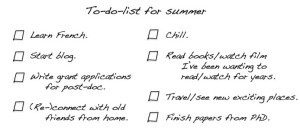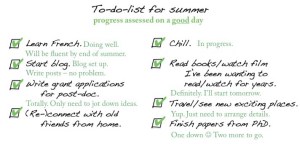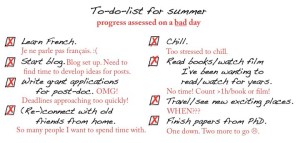Back in 1948, a not-so-unknown producer and director, Alfred Hitchcock, presented audiences with one of his “most experimental” films, Rope. While the storyline (a murder, and the discovery of the murder) never garnered much attention, Hitchcock’s filming technique did: He used extremely long shots of approx 10 minutes each and almost no editing, which gives viewers the impression of events on screen occurring in continuous, real time. Yet, interestingly, the time that passes on screen (105 minutes) is not the same as the length of the film (81 minutes), but when you watch the movie, you don’t notice the disparity between film-time and real-time. I became aware of this phenomenon back in 2002, thanks to an article by Antonio R. Damasio in Scientific American. Damasio argues that one of the reasons we accept this time-disparity, is because our emotional status influences how we perceive time. Thus, when we are happy, we perceive time to pass more quickly, whereas when we are uncomfortable or worried (like, when we are watching a film about murder) time seems to pass more slowly. *
I had mentally filed away this knowledge as merely an interesting cocktail-party-fact, until recently…
I am currently enjoying a three-month summer vacation at home, after having completed my PhD and before starting my post-doc position in France. Well, at least I thought it would be a holiday. I had the vague notion that there were a couple of things I really wanted to do during this period, but friends who had taken in-between-jobs-time before, had warned me that often there is not much relaxation involved. So, I decided to keep plans at a minimum. Here the list:
I am now about a month into my holiday. I don’t feel very relaxed, yet. In fact, I largely feel like I’m on an emotional roller-coaster: some days I wake up, and feel like this:
Other days I think:
Interestingly, I have noticed that how I evaluate my progress is measured in whether or not there will be “enough time for everything”. I’m not sure what is cause and consequence: do I feel there won’t be enough time for everything, because I’m low and therefore perceive things to take longer in general? Or am I low, because I realize that things are taking longer than expected?
Not that I’m really complaining: a long time off is a great thing. Instead, I have the feeling that this to-do-list might end up being like that never-ending series of “last-experiment-to-wrap-up-this-story”. I’ve also come to realize that time-management might be considered a great transferable skill in science, but this does not mean that free-time-management is also a desirable activity. So the real challenge this summer is to learn how to have a proper holiday. I’ll add that to my to-do-list. And probably the three months in-between-jobs-time will be a too short period anyway, irrespective of it being a enjoyable time or a stressful time. After my postdoc I’ll take six months off…
* Not everyone agrees with Damasio. In a blog I found researching for this post, John August points out that “in movies, unless something seems wildly impossible […] audiences are extremely forgiving about time”.



